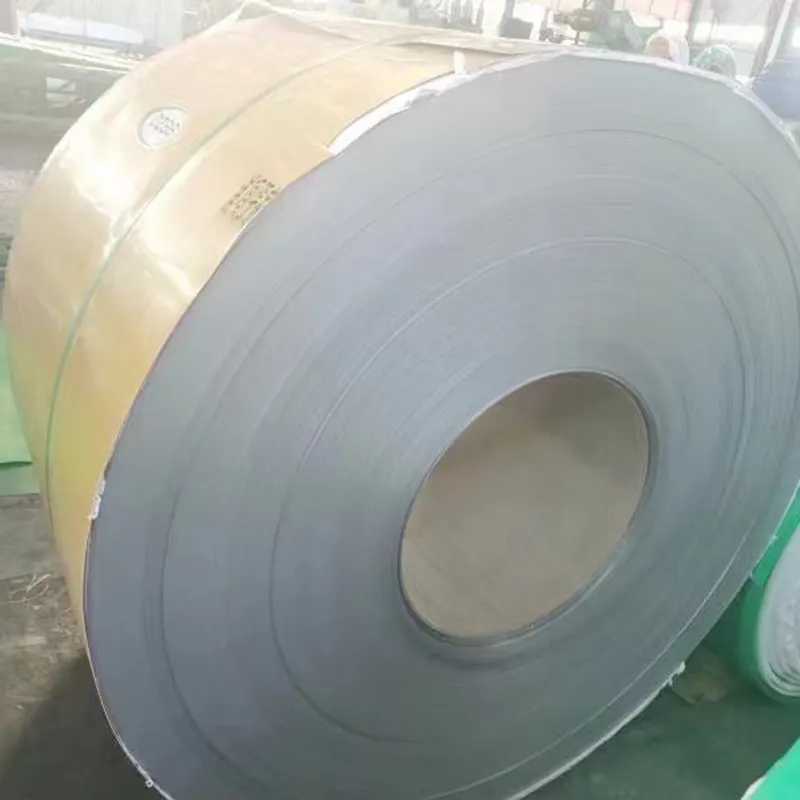Current Challenges in SS Coil Supply Chains
Market Volatility Impacting Steel Logistics
The ups and downs of global steel prices really shake things up for SS Coil supply chains. When prices swing, it hits manufacturers where it hurts most inventory management gets tricky and planning becomes a guessing game. Throw in all those geopolitical issues and ever-changing trade rules, and the whole situation gets even messier. Take last year's tariff situation between China and the US as just one example that completely rewired how companies sourced their materials. Steel prices jumped by around 15% during this period alone, creating all sorts of headaches across the board. Transportation trucks backed up at ports, warehouses filled beyond capacity, and delivery schedules went out the window. For anyone running manufacturing operations right now, getting a handle on these market swings isn't just helpful it's absolutely necessary if they want to keep their supply lines from falling apart under pressure.
Environmental Compliance Requirements
Steel manufacturers are dealing with serious regulatory hurdles that affect how they produce and distribute stainless steel coils. Environmental laws now require strict adherence when it comes to air quality control and proper disposal of industrial waste materials. Many firms across the sector have started adopting greener approaches to stay within legal boundaries. Some are installing advanced filtration systems while others have switched to electric transport fleets for their raw materials. Sure, getting up to speed with all these changes costs money initially, but most find that over time their operations run smoother and they gain respect from environmentally conscious clients. Without tackling these regulatory issues head on, survival in today's competitive stainless steel coil market becomes increasingly difficult for any company.
Key Trends Driving Supply Chain Optimization
Adoption of Green Steel Practices
The shift toward green steel production methods is changing how supply chains work in the stainless steel coil sector. By switching to cleaner processes, manufacturers cut down on carbon footprints through things like solar power installations and material recycling programs. Many businesses find that going green brings real advantages beyond just helping the planet. Energy bills drop when they use less power, and operations run smoother too. Some companies report cutting costs by up to 15% after implementing these changes. While there's still room for improvement, early adopters suggest that sustainable practices are slowly transforming traditional supply chain models across the industry.
Regionalized Manufacturing Networks
The SS Coil industry seems to be moving toward more localized manufacturing setups these days. Companies are setting up shop closer to where materials come from and where products go, which helps them weather storms in international shipping routes. Take a look at what's happening with logistics tech these days it makes getting stuff locally much smoother than before, so we're seeing less reliance on those far away suppliers across oceans. These regional manufacturing hubs give businesses a fighting chance when things change suddenly. They don't shut down completely if something goes wrong somewhere else in the world, though there are still challenges with scaling this approach for larger operations.
JIT Strategies for SS Coil Inventory Management
Implementing Demand Forecasting Models
Getting demand forecasts right is absolutely critical for managing JIT inventory when dealing with stainless steel coils. When done properly, it keeps production moving along without stockpiles sitting around, which cuts down on both waste and those expensive warehouse fees. The steel sector has been picking up various forecasting approaches lately. Time series analysis remains popular, but many companies are also experimenting with causal modeling techniques and even some basic machine learning tools these days. According to several plant managers I've spoken with over the years, bringing in sophisticated data analysis combined with artificial intelligence really does make a difference. These systems pick up subtle patterns in market fluctuations and customer buying habits that traditional methods often miss, giving manufacturers a clearer picture of what's actually going to be needed next month or quarter.
Minimizing Storage Costs Through Buffer Stocks
Maintaining buffer stocks is really important when dealing with supply chain uncertainties, especially for SS Coil production that follows just-in-time manufacturing practices. Businesses often rely on mathematical models to figure out how much inventory they should keep on hand, weighing what it costs to store goods versus what happens if they run out completely. Some manufacturers have actually cut their warehouse bills significantly by getting smarter about these buffer levels. One steel company reported saving around 30% on storage fees after implementing better buffer management strategies. Beyond the money saved, having those extra coils available means operations don't grind to a halt during unexpected delays, which makes the whole supply network much tougher against disruptions.
Leveraging Data Analytics for Process Improvement
IoT Integration for Real-Time Quality Tracking
When companies bring IoT technology into their current supply chain systems, they gain the ability to monitor SS Coil quality while it's still on the production line. Sensors placed throughout manufacturing facilities collect all sorts of information straight from where the coils are being made, giving workers actual visibility into what's happening with each batch. This kind of instant feedback helps catch problems early before they turn into bigger issues, so the final products maintain that consistent standard customers expect. For manufacturers working in sectors like automotive or aerospace where even small inconsistencies can cause major headaches down the road, having this level of control makes all the difference.
Predictive Maintenance for Production Lines
Predictive maintenance utilizes data analytics to foresee equipment failures before they occur, ensuring efficient SS Coil production operations. Machine learning and predictive algorithms help manufacturers interpret data produced by manufacturing equipment, predicting when maintenance is required. This not only minimizes unplanned downtime but enhances overall productivity of production lines.
Supplier Transparency Initiatives
When suppliers implement transparency programs, it really boosts confidence and makes SS Coil supply chains much stronger overall. Open lines of communication between companies and their partners create a foundation of trust that holds up even when things go wrong. For instance, when manufacturers share live updates on production status or inventory levels, everyone stays on the same page regarding quality control and delivery schedules. This kind of information sharing helps catch problems early before they become major headaches. The result? Better day-to-day operations and a supply network that can weather unexpected challenges without collapsing under pressure.
Cross-Industry Logistics Partnerships
Cross-industry logistics partnerships are emerging as a strategic trend to bolster SS Coil supply chain efficiency. Collaborating across industries optimizes operations, reduces costs, and improves service levels. These partnerships allow businesses to share resources, expertise, and infrastructure, providing flexibility during times of volatility and ensuring continuity and resilience.
Sustainability in SS Coil Distribution
Carbon-Neutral Transportation Solutions
The SS Coil distribution sector is shifting towards carbon-neutral transportation methods, aiming to reduce environmental footprint. Technologies like electric and hybrid vehicles offer cleaner alternatives to traditional transport. These efforts enhance sustainability and optimize supply chain efficiency by reducing dependency on fossil fuels and providing stable logistics solutions.
Closed-Loop Recycling Systems
When companies integrate closed loop recycling into their stainless steel coil operations, they get real benefits for both resources and the environment. The system works by keeping materials in circulation instead of letting them become waste, which saves on new resources and cuts down environmental damage over time. From a business perspective, there's money to be saved too. Lower costs for raw materials plus avoiding those expensive waste disposal fees adds up fast. Many manufacturers have seen their profit margins improve after switching to this approach. Plus, adopting such practices shows customers and stakeholders that these businesses care about doing what's right for the planet while still running profitable operations.

Measuring Supply Chain Optimization Success
KPIs for Lead Time Reduction
Figuring out the right key performance indicators or KPIs makes all the difference when it comes to cutting down lead times in SS Coil supply chains. Things like how long orders take from start to finish, the actual production lead time itself, plus those on time delivery numbers really help track what's working and what isn't. When companies keep an eye on these metrics regularly, they can spot problems early and tweak their processes to run smoother. The whole point of this continuous checkup approach is to shave off those unnecessary delays across the board. Most manufacturers find that sticking with this method pays off handsomely in terms of getting products out the door faster without compromising quality.
ROI Analysis of Automation Investments
Conducting return on investment (ROI) analysis for automation investments in SS Coil supply chain optimization ensures economic justification and improved efficiency. Metrics including reduced operational costs and shorter processing times assess ROI. Automation investments lead to remarkable gains, illustrating tangible benefits and strategic advantages for SS Coil manufacturing process.
FAQ Section
What causes steel price fluctuations in SS Coil supply chains?
Steel price fluctuations are caused by global market volatility, geopolitical factors, and trade policies affecting SS Coil supply chains.
How does environmental compliance affect SS Coil production?
Compliance with environmental regulations impacts SS Coil production by necessitating investments in cleaner technologies and sustainable practices.
What are green steel practices in SS Coil manufacturing?
Green steel practices involve using renewable energy sources and recycled materials to minimize carbon emissions in SS Coil manufacturing.
Why are regionalized manufacturing networks important?
Regionalized manufacturing networks are important for minimizing transportation costs and lead times, offering resilience against global disruptions.
How do IoT and predictive maintenance improve SS Coil production?
IoT offers real-time quality tracking, while predictive maintenance uses data analytics to prevent equipment failures, enhancing SS Coil production efficiency.
What are the benefits of supplier transparency initiatives?
Supplier transparency initiatives build trust and resilience in SS Coil supply chains by promoting open communication and visibility among partners.
Table of Contents
- Current Challenges in SS Coil Supply Chains
- Key Trends Driving Supply Chain Optimization
- JIT Strategies for SS Coil Inventory Management
- Leveraging Data Analytics for Process Improvement
- Supplier Transparency Initiatives
- Cross-Industry Logistics Partnerships
- Sustainability in SS Coil Distribution
- Measuring Supply Chain Optimization Success
-
FAQ Section
- What causes steel price fluctuations in SS Coil supply chains?
- How does environmental compliance affect SS Coil production?
- What are green steel practices in SS Coil manufacturing?
- Why are regionalized manufacturing networks important?
- How do IoT and predictive maintenance improve SS Coil production?
- What are the benefits of supplier transparency initiatives?


